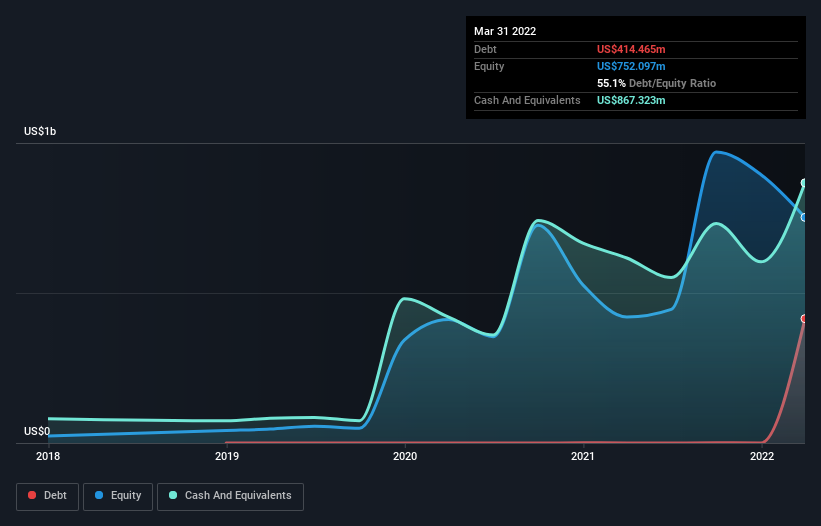Is Virgin Galactic Holdings (NYSE:SPCE) Weighed On By Its Debt Load?
David Iben put it well when he said, 'Volatility is not a risk we care about. What we care about is avoiding the permanent loss of capital.' When we think about how risky a company is, we always like to look at its use of debt, since debt overload can lead to ruin. Importantly, Virgin Galactic Holdings, Inc. (NYSE:SPCE) does carry debt. But is this debt a concern to shareholders?
Why Does Debt Bring Risk?
Debt and other liabilities become risky for a business when it cannot easily fulfill those obligations, either with free cash flow or by raising capital at an attractive price. In the worst case scenario, a company can go bankrupt if it cannot pay its creditors. However, a more common (but still painful) scenario is that it has to raise new equity capital at a low price, thus permanently diluting shareholders. Of course, plenty of companies use debt to fund growth, without any negative consequences. When we examine debt levels, we first consider both cash and debt levels, together.
Check out our latest analysis for Virgin Galactic Holdings
What Is Virgin Galactic Holdings's Net Debt?
The image below, which you can click on for greater detail, shows that at March 2022 Virgin Galactic Holdings had debt of US$414.5m, up from US$363.0k in one year. However, its balance sheet shows it holds US$867.3m in cash, so it actually has US$452.9m net cash.
How Strong Is Virgin Galactic Holdings' Balance Sheet?
We can see from the most recent balance sheet that Virgin Galactic Holdings had liabilities of US$142.9m falling due within a year, and liabilities of US$457.2m due beyond that. On the other hand, it had cash of US$867.3m and US$3.10m worth of receivables due within a year. So it can boast US$270.4m more liquid assets than total liabilities.
This surplus suggests that Virgin Galactic Holdings is using debt in a way that is appears to be both safe and conservative. Due to its strong net asset position, it is not likely to face issues with its lenders. Succinctly put, Virgin Galactic Holdings boasts net cash, so it's fair to say it does not have a heavy debt load! There's no doubt that we learn most about debt from the balance sheet. But it is future earnings, more than anything, that will determine Virgin Galactic Holdings's ability to maintain a healthy balance sheet going forward. So if you want to see what the professionals think, you might find this free report on analyst profit forecasts to be interesting.
In the last year Virgin Galactic Holdings managed to produce its first revenue as a listed company, but given the lack of profit, shareholders will no doubt be hoping to see some strong increases.
So How Risky Is Virgin Galactic Holdings?
Statistically speaking companies that lose money are riskier than those that make money. And we do note that Virgin Galactic Holdings had an earnings before interest and tax (EBIT) loss, over the last year. And over the same period it saw negative free cash outflow of US$254m and booked a US$316m accounting loss. However, it has net cash of US$452.9m, so it has a bit of time before it will need more capital. Overall, its balance sheet doesn't seem overly risky, at the moment, but we're always cautious until we see the positive free cash flow. When analysing debt levels, the balance sheet is the obvious place to start. However, not all investment risk resides within the balance sheet - far from it. For example, we've discovered 4 warning signs for Virgin Galactic Holdings that you should be aware of before investing here.
At the end of the day, it's often better to focus on companies that are free from net debt. You can access our special list of such companies (all with a track record of profit growth). It's free.
Have feedback on this article? Concerned about the content? Get in touch with us directly. Alternatively, email editorial-team (at) simplywallst.com.
This article by Simply Wall St is general in nature. We provide commentary based on historical data and analyst forecasts only using an unbiased methodology and our articles are not intended to be financial advice. It does not constitute a recommendation to buy or sell any stock, and does not take account of your objectives, or your financial situation. We aim to bring you long-term focused analysis driven by fundamental data. Note that our analysis may not factor in the latest price-sensitive company announcements or qualitative material. Simply Wall St has no position in any stocks mentioned.

 Yahoo Finance
Yahoo Finance 
